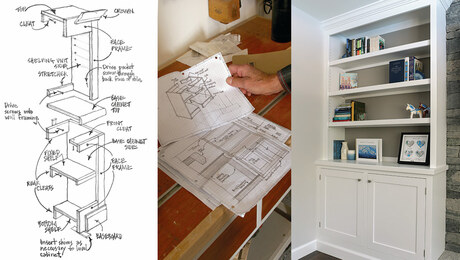What’s the opinion of installing a vent free gas space heater in a finished basement room? Should I be concerned about excess water vapor or smells?
Discussion Forum
Discussion Forum
Up Next
Video Shorts
Featured Story

A standardized approach, quick-to-install hardware, and a simplified design make building custom casework cost-effective.
Featured Video
How to Install Exterior Window TrimHighlights
"I have learned so much thanks to the searchable articles on the FHB website. I can confidently say that I expect to be a life-long subscriber." - M.K.














Replies
Bad idea. don't do it.
But you know that already or you wouldn't have posted this question.
M
------------------
"You cannot work hard enough to make up for a sloppy estimate."
ShelterNerd gave the correct answer.
Do an advanced search for "ventless gas heater" for some long winded discussions.
............Iron Helix
I'm not sure who is right and who is wrong, but they are illegal in Canada and about 5 states in the U.S.
I'm with the don't do it crowd.
Can you do a direct vent model?
It is a basement with poured walls. So I was trying to avoid a direct vent. What are the reasons it is not recommended? It may be illegal in five states because their building code may be out of date just like many old laws are still on the books.
I think the main reason is a vent free heater sends its exhaust (containing carbon monoxide) directly into the room.
All exhaust and water vapor is sent into the living space. Remember, the problem is cumulative, so if you have a water heater, a cooktop, an oven, and a heater going, they all add water vapor to the air, which condenses someplace, invites mold growth, etc.Of course, it is also a function of the house design, specifically how well sealed they are. Canada likes it's houses sealed up REALLY well. So they don't like exhaust by-products inside the building.
There is not such thing as a VENT FREE heater unless it is electric.
The Question is if it vents the combustion fumes and moisture INSDIE the house or OUTSIDE.
.
A-holes. Hey every group has to have one. And I have been elected to be the one. I should make that my tagline.
They have been discussed here before.
The biggest concern is possibly dying from carbon monoxide, or developing long term disabilities from lower lever exposures.
Excessive moisture from condensation of the water vapor produced by combustion is a concern.
Various other byproducts of combustion.
"Vent Free" does not mean there is no venting of combustion gases - it means your using your living area as a chimney.
I wouldn't put one in my house, and I have expensive meters and equipment to test, monitor and maintain them.
If you decide to, be sure to use a good quality CO detector: one with a digital readout as a minimum, a low lever detector is best, and necessary if there is anyone with increased susceptibility: infants, elderly, pregnant women, people with medical problems such as heart problems, immune system problems, lethargy, etc.
FWIW: I have taken a number of courses in combustion analysis and CO Safety, and I have continued to test and learn in the field as a home inspector who offers such testing as a supplement.
May your whole life become a response to the truth that you've always been loved, you are loved and you always will be loved" Rob Bell, Nooma, "Bullhorn"
"We Live" http://www.youtube.com/watch?v=7kuBgh0VCqI&mode=related&search
And Annie Ross's "Twisted" http://www.youtube.com/watch?v=8lqivrCIRGo&mode=related&search=
Edited 1/22/2008 12:07 pm ET by rjw